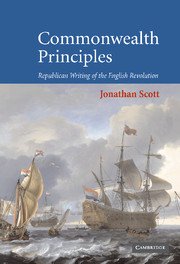1 - Classical republicanism
Published online by Cambridge University Press: 22 September 2009
Summary
[T]here were an exceeding great number of men of the better sort, that had been so educated, as that in their youth having read the books written by famous men of the ancient Grecian and Roman commonwealths concerning their polity and great actions; in which books the popular government was extolled by the glorious name of liberty, and monarchy disgraced by the name of tyranny; they became thereby in love with their forms of government. And out of these men were chosen the greatest part of the House of Commons, or if they were not the greatest part, yet, by advantage of their eloquence, were always able to sway the rest.
Thomas Hobbes, Behemoth; or, The Long Parliament‘CLASSICAL REPUBLICANISM’
The concept of ‘classical republicanism’ was developed to explain something about the relationship between seventeenth-century English literature and politics. Zera Fink's The Classical Republicans was the work of an American scholar of Wordsworth and Milton who came, through his interest in the latter, to identify a group of writers whose work was influenced by classical sources and political examples. This may now seem unremarkable, amounting to little more than the claim that seventeenth-century English republicans were humanists. Yet, as we have needed recent reminders that the era of Reformation, and Counter-Reformation, did not end in the sixteenth century, so recent scholarship, not least of English literature, has returned to underline contemporary claims both that seventeenth-century England remained a renaissance culture, and that this fact had important political implications.
Information
- Type
- Chapter
- Information
- Commonwealth PrinciplesRepublican Writing of the English Revolution, pp. 19 - 40Publisher: Cambridge University PressPrint publication year: 2004
